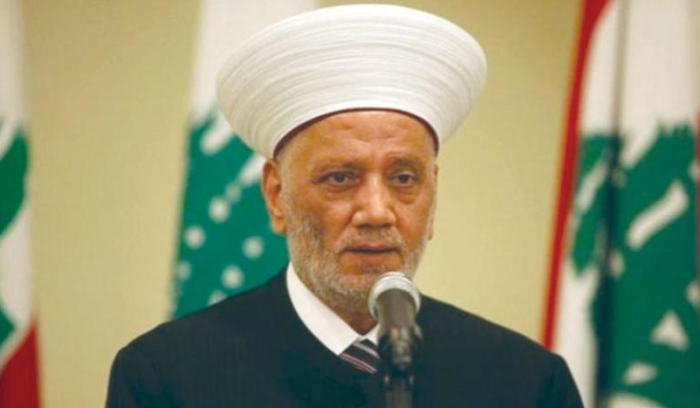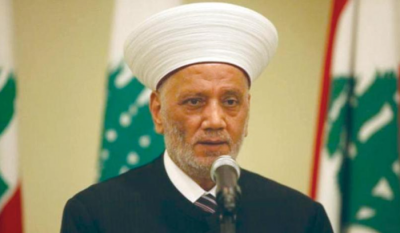The Grand Mufti of the Lebanese Republic, Sheikh Abdul-Latif Daryan, delivered a speech during the fifth Saudi-Lebanese cultural forum titled "Martyr of the Message, Mufti Sheikh Hassan Khaled," which was held at the residence of the Saudi Arabian Ambassador Walid Bukhari in Yarzeh. He expressed his gratitude and appreciation to His Excellency Ambassador of the Custodian of the Two Holy Mosques, Mr. Walid Bukhari, for the kind invitation to hold and sponsor the cultural gathering, noting that it is fitting to gather on the occasion of the thirty-third anniversary of the martyrdom of the Mufti of the Lebanese Republic, Sheikh Hassan, under the title "Martyr of the Message." He emphasized the esteemed position of martyrs with God, especially when the martyr is a scholar, a mufti, a man of goodness, and a contributor to national, Arab, and Islamic achievement.
Daryan quoted the Quran, stating: “And do not think of those who have been killed in the cause of Allah as dead; rather, they are alive with their Lord, receiving provision. They are rejoicing in what Allah has given them of His bounty and rejoicing for those who have not yet joined them from behind them. No fear will there be concerning them, nor will they grieve.” He asserted that the late Mufti Hassan Khaled is not someone to be remembered only on the occasion of his martyrdom; through his faith and actions, he took religious, moral, national, and Arab stances that made him live on. Daryan noted that because he was martyred for the sake of God, the martyrs are alive with Him, and his Islamic, national, and Arab positions are the foundational stances of the Dar al-Fatwa, defending Islam as a creed and methodology and affirming the Lebanese homeland, which we all have accepted as our final homeland, preserving Lebanon's Arab identity.
He continued by stating that the anniversary of this great man, a figure of Islam, the homeland, and the nation, should not pass without lessons and hope for Muslims, Lebanese, and all Arabs. The lesson is that steadfastness in the face of hardships brings a double reward: once for achieving martyrdom and another for winning the cause for which the martyr was killed to prevent its realization. The cause of Hassan Khaled has triumphed, which is the cause of all the great martyrs of the nation—the cause of keeping Lebanon free, sovereign, and independent, Arab in identity and belonging, renewing hope in the homeland and the state, a state of citizenship and its institutions, encompassing diversity within a framework of national unity and cohabitation, and aspiring for a better tomorrow.
Daryan noted that this is the cause that Lebanon’s great men have worked for, many of whom have been taken by death or murder. However, the scales are those of righteous deeds, which our martyr Hassan Khaled and our great martyr heroes have fought for. Since the cause has remained alive, these men have stayed alive, while their oppressors have come and gone. It is up to our youth to carry the torch of freedom and the flame of martyrdom, which expresses the courage of freedom and the bravery in pursuing its strength, horizons, and noble goals.
Daryan remarked that our generation has known Hassan Khaled during his peak contributions in the 1970s and 1980s. He mentioned that they, as religious scholars, had grown under his tutelage as a teacher and then worked alongside him when he assumed the position of the mufti. They witnessed firsthand his noble efforts in the realms of knowledge and religion and in the affairs of the homeland and citizens. He served as a model and example for them in his work, character, humanity, and profound understanding of Lebanese issues, as well as Arab and Islamic matters. Daryan affirmed that he had never encountered someone with a similar unmatched concern for both major and minor affairs, nurturing the youth, living their aspirations and problems, and being able to tackle challenges in religious, national, Arab, and humanitarian contexts.
Daryan emphasized the significance of the remembrance of Mufti Khaled this year, which evokes within us the ideals, morals, and values that motivated him. The key to understanding his character might be the expression or term: Ethics of Responsibility. The constitutional institutions and political life were paralyzed, so he brought together the Islamic meetings at Dar al-Fatwa or at his home in Aramoun to maintain the political quorum and keep Beirut present. Concerned about the impact of war divisions on Lebanese identity and the relationships between Muslims and Christians in their shared homeland, he launched, along with the late Imam Muhammad Mehdi Shamseddine, the document of Dar al-Fatwa's ten constants in 1983, which declared that Lebanon is a final homeland for all its people. His constant slogan was the return to a strong and just state— a state of inclusive citizenship, the rule of law, commencing from the establishment of a state vigilant over its land and people to resist the Israeli enemy, which had reached Beirut.
He concluded that today we stand with the memory of a figure beloved and esteemed by all Lebanese and Arabs. Wherever we traveled in the Arab or European world, we found the memory of Hassan Khaled fragrant and present. If the ethics of responsibility characterized his personality and work, then his connection with the Arabs stemmed from a deep sense of belonging and shared destiny. He sought to strengthen ties with Egypt, Saudi Arabia, Kuwait, the UAE, and other Arab nations, with the ongoing issues and wars in Lebanon and foreign interventions always at the forefront of his travels. He often claimed that there would be no solution for Lebanon except through an Arab solution. When the Arabs intervened to end the war and formed a committee for that purpose, the martyr mufti collaborated with it and went, along with Patriarch Sfair and other religious authorities at that time, to Kuwait for meetings, providing a set of proposals. On the path to efforts to resolve the conflict, Mufti Hassan Khaled was martyred on May 16, 1989, in a bombing targeting his convoy near Dar al-Fatwa in the Aisha Bakar area. Therefore, he missed the Taif Conference, which concluded the armed conflict and issued the National Accord Document at the end of 1989. He met the martyred President Rafik Hariri, who was making steady strides towards holding the Taif Conference, supported and hosted by the Kingdom of Saudi Arabia.
Daryan concluded by remarking that the anniversary of Mufti Hassan Khaled’s martyrdom coincides this year with the issue of Palestine and the city of Jerusalem, which remain absent. The Palestinian people struggle almost entirely alone against the oppressive Zionist occupation. He prayed to God to honor the great mufti and bless us with his martyrdom, to support the people of Jerusalem and Palestine against the Zionist occupation, against religious discrimination, and against oppressive racism. He is the All-Hearing, the Responsive. He ended with a prayer for mercy upon the martyr Mufti Sheikh Hassan Khaled and for comfort for Muslims, Lebanese, and Arabs, guiding them on the path of truth, sincerity, the message, and the honorable legacy of the martyr mufti, and that God protect our homelands and our humanity.




